22-year old Ingrid Sarah Danald wears many hats. Describing herself as ‘a late-blooming sunflower who only flourished in the final couple weeks of summer’, she is determined to make the most of the time she has left at Swinburne so she could graduate with flying colours and remarkable memories.
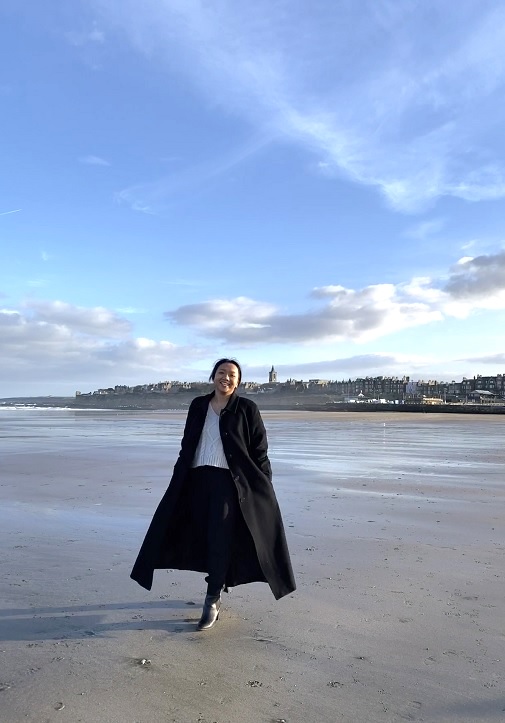
1. Why did you choose to pursue a degree in International Business?
Despite coming from a pure science background, I wanted to chase after a mathematical and statistical business-based career. So I chose to major in International Business as I wanted to become an actuary with a focus on the ASEAN social and geopolitical landscape.
However, I had a change of heart when I studied the Global Logistics and Supply Chain Management unit in Year 2. I became interested in supply value chain management. I find this subject holds a certain charm to it – the use of mathematics and statistics to manage the supply of raw materials and subsequently produce a finished product.
2. From business to arts. Tell us how did you pick up abstract painting.
If you have an older sibling who you adore dearly, you would want to follow in their footsteps in everything they do. My older sister, Iona Danald, is an award-winning textile artist. Seeing her dedication and perseverance made me question the charm of creating art and immersing oneself in the art world.
As a beginner, I was initially lost in a selection of art styles, techniques and mediums. But as I began to experiment further, I found myself to be more comfortable with abstract art because I am not restricted to painting an object or a view but comfortably expressing myself in a way that I can visibly see and tangibly hold. This also allows me to understand my unconscious mind and how I am doing mentally which is an aspect of abstract art that I enjoy thoroughly.
3. I’m sure behind every painting, there’s a story to tell. What are your stories?
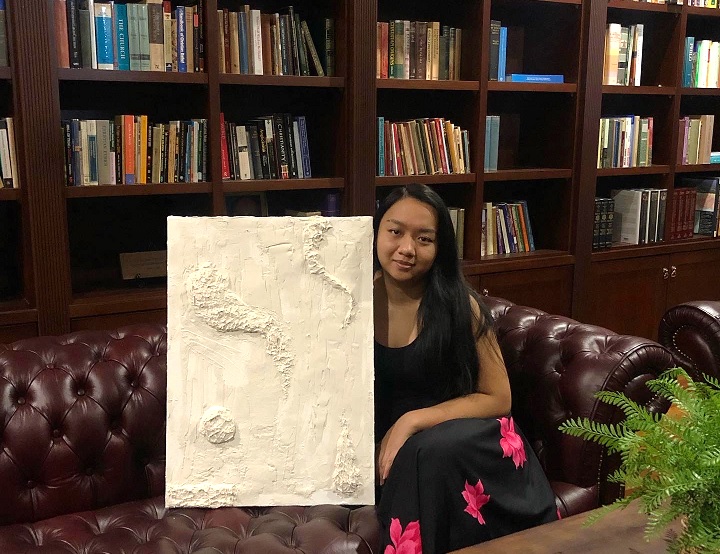
Although I do enjoy reading the stories behind every painting, I don’t have specific stories behind mine. I would say my pieces have feelings – or at least how I perceive feelings to tangibly look like.
For example, this piece (photo above) portrays how I perceive what silent anger looks like. Silent anger has always been interesting to me as it is the powerful notion of using reticence to express one’s anger, an interesting tautology. Using no words and reduced body language to express a thousand words and hundreds of actions. I restricted myself from colours, leaving the piece to be white which is the colour of purity. This way, I express to the viewer that white can still be a sharp and damning colour like how silence can carry so much meaning and expression.
4. Where do you get your inspiration from?
Thanks to being stuck at home due to the pandemic, I have ample time to spend on mindfulness sessions and reflect on my feelings which subsequently affect my actions. I write down lessons regardless of how big or small they are so I can learn to understand myself and why I feel uncomfortable in certain situations. From these sessions, I remember my feelings and try to paint them as is. This way, I am able to translate my feelings onto the canvas wholeheartedly during my abrupt painting antics in my home studio.
On those days when I don’t feel like painting my feelings, I turn to Reddit as I enjoy the writings conveyed with full emotions and I can empathise with them.
5. According to studies, arts education is important in improving overall academic performance. Do you agree?
I do agree because, through arts education, one can increase cognitive development and self-awareness. Cognitive development can aid students to study smart and better understand information rather than learning purely by memorising. On the other hand, self-awareness helps students to reflect on who they are, why they respond to certain situations as they do, and can further provide them with a direction for self-improvement. With high self-awareness, students can develop a strong belief in their academic ability and in achieving any goals they have in mind.
6. Share with us your experience as an intern at The Hills, Kuching.
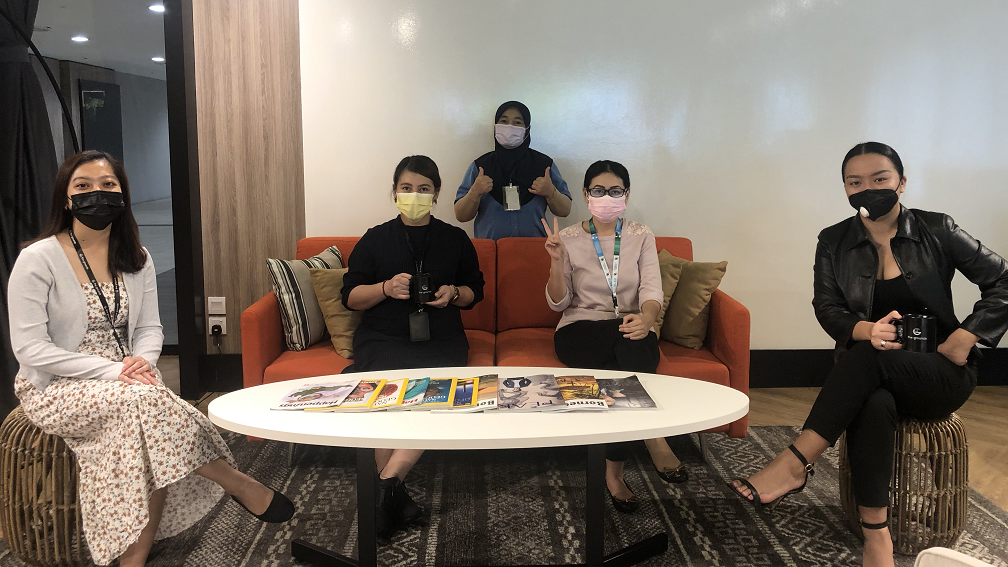
I started as a Community Associate at The Grounds Coworking Space under The Hills management where I had the opportunity to connect with the tenants and build my network.
For my second internship at The Hills, I was placed under the HR and Marketing Department. I spent the initial five weeks under Marketing to plan, execute and market The Hill’s events, campaigns, and programmes before moving to the HR department to complete my internship. I used my connections to contact businesses and individuals, and also had the chance to have my designs and proposed events presented at The Hills’ Board of Directors Meeting.
7. From your own internship experience, what do you think are the five (5) most vital skills students should equip themselves with before entering the workplace?
Proactiveness – I can’t stress enough how important it is to take the initiative to learn, do things on your own and grow your network. The relationships you build will open more doors before you even know it.
Accountability – this allows you to gain trust and respect among the people you work with. Even if you have made a mistake, they still trust you to do a good job because you take full responsibility for what you have done wrong.
Critical thinking – it is one of the key factors to completing your tasks efficiently. Critical thinking helps you to make the most suitable decision and prioritise accordingly.
Emotion management – a flower blooms in a sunny environment, if you get my drift. Everyone needs a conducive and positive work environment, so that means controlling your emotions and the emotions of others so as not to be too overwhelmed by the ups and downs of the workplace.
Time management – good time management not only means less stress but also allows me to work efficiently and have some downtime. I spent most of my internship nights painting, watching Netflix, and enjoying time with my family.
8. Five (5) reasons why students are encouraged to go through an internship programme.
Students can apply theoretical knowledge into real-life practice; grow professionally and understand the do’s and don’ts in the workplace; expand your network (you’ll never know if someone views you as a potential employee or may want to connect with you due to your social activities); discover if you truly like the job (the harsh reality might shock you but with internship experience, at least you are better prepared); and it helps you gain a competitive advantage over your peers.
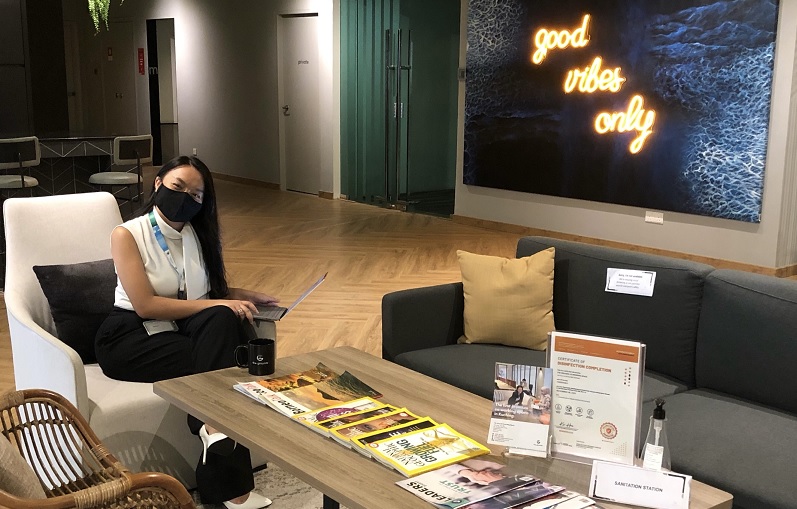
9. Tell us more about your involvement with the Swinburne Sarawak Korean Club.
As current President of the club, together with the EXCO members and club advisor, we create virtual events and activities such as Korean Language Classes and Swinburne Short Course facilitated by Swinburne School of Foundation! The goals are to empower and spread the Korean language and culture among the community in Kuching, and help provide a fun and meaningful platform for students who are having a rough time during this pandemic.
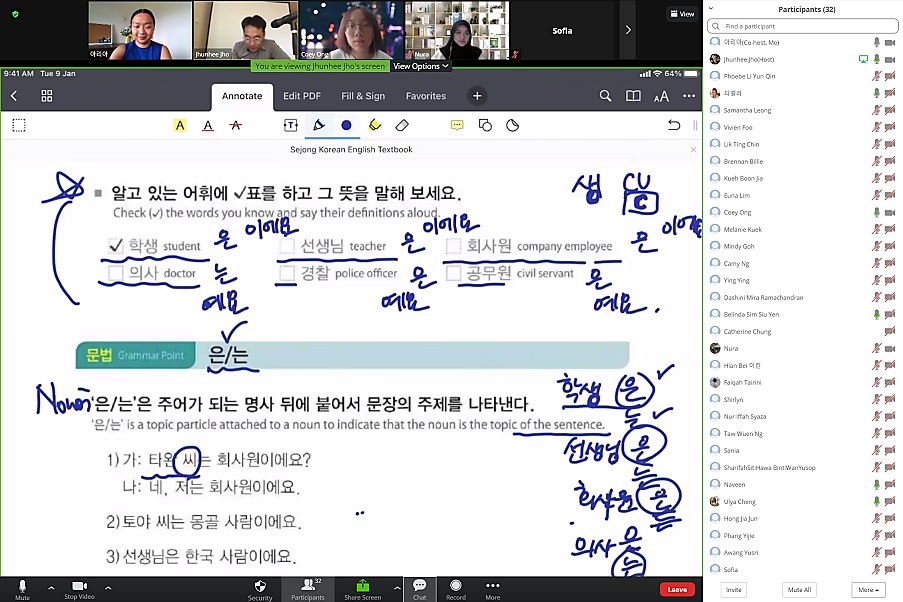
10. How would you best describe your university journey as a Swinburne student?
For my first and a half year at Swinburne, I never really considered myself as a ‘Swinbee’. I was a late-blooming sunflower, so to speak. But as the sun began to pour the last of its warmth onto my leaves, I decided to make the best of my university life. I became active in co-curriculum activities, achieved a 3.89 CGPA, volunteered as a student panellist for Malaysia Qualifications Agency (MQA) and attended more Swinburne virtual events. So even with wilting leaves and the sun’s lukewarm bask, I make sure that I end my university journey on a high note.
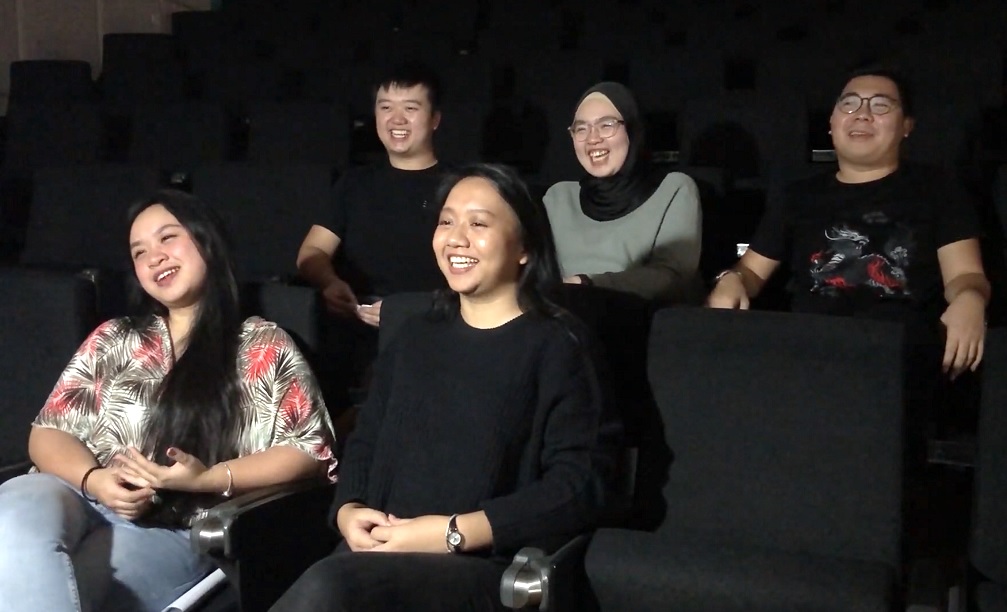
11. What’s your advice for SPM school-leavers who have yet to decide on their next chapter?
Sometimes, things just don’t work out or we have a change of heart. We were all 17 and now have the next 60 years to live, hopefully. It’s always ok to change your plan even at the age of 35 or older! None of us has everything plan out for us in the first place anyway. Excel as much as you can, even if it means doing it alone in another city, state, country, or continent.

12. Finally, the typical interview question. What are your future plans five (5) years from now?
At the moment, I am focused on improving my academic performance so I could pursue my Master of Business (Research). I received a scholarship to pursue my postgraduate studies but I have yet to select a thesis topic or a key researcher to be assigned to. Once that is done, I plan to take an 18-month long Employability Graduate Programme to increase my employability and enhance my work experience.

